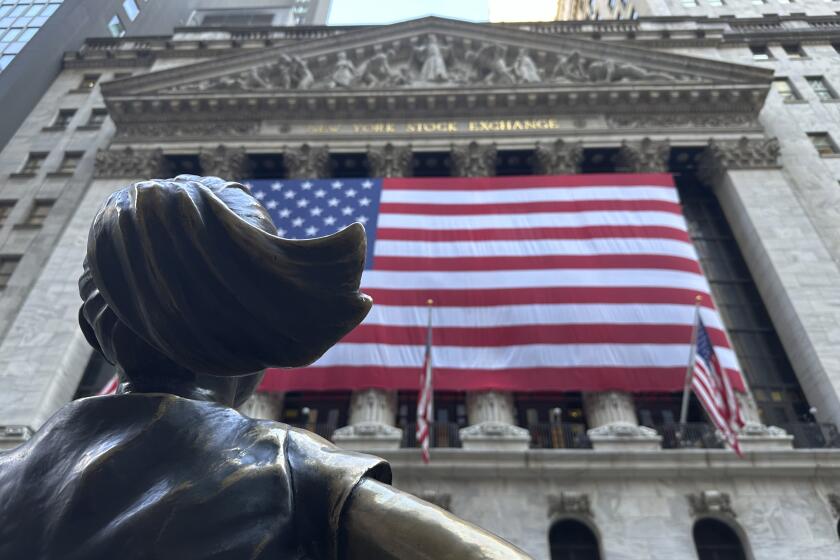CEO Brian Moynihan says Bank of America is turning the corner on its Countrywide woes
Bank of America Corp.’s chief executive is out to convince Wall Street that he’s finally bringing under control the financial disaster caused by the bank’s acquisition of mortgage goliath Countrywide Financial Corp.
Brian Moynihan, who took the helm at the nation’s biggest bank in late 2009, has had the unrelenting task of cleaning up an institution in such financial disrepair that the bank needed $45 billion in federal bailouts to stay in business.
The Charlotte, N.C., bank posted an $8.8-billion second-quarter loss Tuesday as it continued to deal with the aftermath of the housing bust.
In an interview with The Times this week, Moynihan said Bank of America is finally gaining traction both in dealing with demands that it buy back bad Countrywide loans from investors and in whittling down the massive number of distressed mortgages it deals with as the nation’s largest provider of mortgage customer service.
Years of work remain, Moynihan said, but his bank is now resolving the cases of seriously delinquent borrowers faster than new delinquencies are arising.
“We had a period of [working out] things to do with the economic crisis — deal with capital markets, credit cards, things like that — and now the mortgages are the last piece,” he said.
Cleaning up Countrywide, the Calabasas home lender that teetered near bankruptcy when Bank of America bought it for $2.5 billion in July 2008, remains a difficult task. Even before the latest quarter, mortgage operations had lost about $16 billion since the acquisition was completed.
One bright spot is that the number of loans that have fallen at least 60 days behind on payments — a key indication of serious delinquencies coming — has been declining, including a 5% drop from the first quarter this year to the second, Moynihan said.
He said those loans near default — 90 days or more past due — also fell because of “our work with loan modifications, short sales, foreclosures, recoveries on loans that go back to current status.”
The interview with Moynihan took place at the Westwood offices of Merrill Lynch, the giant brokerage that his predecessor, Kenneth Lewis, acquired in another controversial deal as the global financial system seized up in September 2008.
He said the bank would be able to deal with its remaining mortgage problems without a need to boost its capital cushion to guard against losses. Some analysts have speculated that the bank might need to make such a move, perhaps by selling Merrill Lynch, which has proved to be profitable.
He bristled at the reports: “Absolutely not. Merrill Lynch is part of Bank of America now.”
Independent bank analyst Nancy Bush said Wall Street retained “a huge reservoir of goodwill” toward Moynihan. However, she believes more bad news — and a resulting need to raise capital — may be in store for his bank. And credibility issues exist.
Moynihan’s biggest error so far, she said, was reassuring shareholders that he would raise the bank’s dividend — now just a penny a share per quarter — sometime this year. The Federal Reserve rejected his request to do so, and it may be well into 2012 before that can be done, he acknowledged.
Moynihan also backed off a tough line he had taken with holders of privately issued mortgage securities, who had been demanding that he buy back soured Countrywide loans backing bonds that had plummeted in value.
He had told the bondholders, including powerful institutional investors such as Blackrock Inc. and Pimco, that BofA would negotiate with them on a case-by-case basis in a process that could have taken years. But Moynihan then worked out a deal to settle with them for $8.5 billion, part of the $20 billion in mortgage costs recorded in the second quarter, and earmarked an additional $5.5 billion for similar settlements in future.
“The Street believes these types of charges are just going to keep dinging them,” said Bush, a contributing editor to banking information provider SNL Financial.
The worries, she said, include the outcomes of negotiations over botched foreclosures by a coalition of state and federal officials headed by Iowa Atty. Gen Tom Miller; an investigation of mortgage securities by New York Atty. Gen. Eric Schneiderman; and California Atty. Gen. Kamala Harris’ announcement of her own investigation into the mortgage mess, including the sale of toxic securities to entities in California.
“Every AG who has a political agenda has got their hand on this thing,” Bush said. “Everybody wants that final hack at Bank of America.”
Before the mortgage meltdown, Bank of America was a $50 stock. Then came the roller coaster: The shares fell below $4 in early 2009, shot back above $17 a year later, and since have bumped lower again, hitting bottom at $9.57 on Tuesday. The stock fell 10 cents to $10.13 on Friday.
Moynihan wouldn’t comment on the biggest immediate hurdle for Bank of America and four other big providers of mortgage customer service: settling with various state and federal officials.
Major financial companies face financial penalties and an overhaul of procedures for dealing with distressed borrowers in the wake of revelations that the loan servicers cut corners at the expense of customers in processing foreclosures.
The three largest servicers — Wells Fargo & Co. and JPMorgan Chase & Co. as well as BofA — were punished by the government last month for their handling of troubled borrowers. The Obama administration cut off incentive payments to the banks under its signature loan-modification program, saying they needed “significant improvement” in their servicing operations.
To deal with the servicing troubles, Moynihan has assigned former OneWest Bank Chief Executive Terry Laughlin, a longstanding ally, to deal with soured loans and foreclosures.
Bank of America has 35,000 employees of its own dealing with distressed borrowers, and in its recent settlement with the mortgage-bond investors, it agreed to outsource the handling of many of the loans to smaller loan-servicing firms.
“Most importantly, the stuff’s moving through the system,” Moynihan said. “We’re modifying and short-selling and other things faster than they’re coming in.”
More to Read
Inside the business of entertainment
The Wide Shot brings you news, analysis and insights on everything from streaming wars to production — and what it all means for the future.
You may occasionally receive promotional content from the Los Angeles Times.







